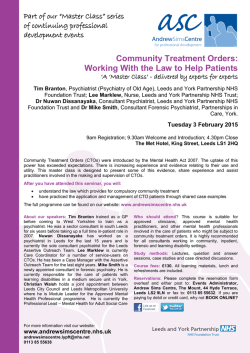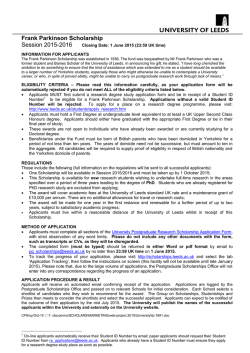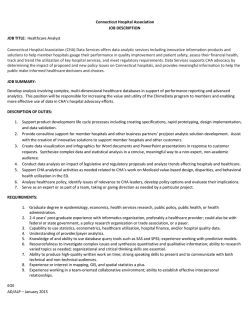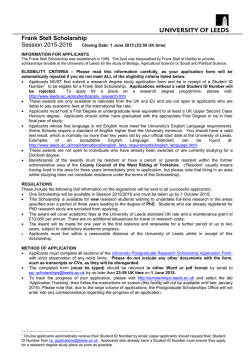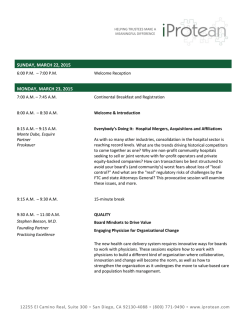
here - Improvement Academy
Invitation to a symposium with international experts IMPLEMENTATION SCIENCE: ADVANCING POLICY AND PRACTICE Wednesday 11th February 2015 10.15 to 16.00 Executive Suite, Yorkshire County Cricket Club, Leeds This is an invited event for senior clinicians, managers, policy-makers and researchers. We will be sharing current evidence and opinion on the implementation of evidence-based practice and quality improvement. Speakers include leading international experts from North America and Europe. We will also be sharing emerging findings and lessons from ASPIRE: Action to Support Practices Implementing Research Evidence. This is an NIHR-funded programme of research for primary care. Our mission is to develop and test ways to support general practices in implementing evidence-based practice effectively within the constraints and challenges of real-life general practice. RSVP to Wendy Hobson: [email protected]; 0113 343 0837 The CLAHRC Yorkshire and Humber PROGRAMME Registration and refreshments 10.15 Welcome to the symposium Professor John Wright, Director of Bradford Institute for Health Research 10.45 What is implementation science and why do we need it? Jeremy Grimshaw, Senior Scientist, Clinical Epidemiology Program, Ottawa Hospital Research Institute & Canada Research Chair in Health Knowledge Transfer and Uptake 11.00 Can we get better at tailoring approaches to improve practice? Michel Wensing, Professor of Implementation Science, Radboud University Medical Centre, Scientific Institute for Quality in Healthcare, Nijmegen 11.25 What can behavioural sciences Jill Francis, Professor of Health Services Research, City offer? University, London 11.50 What have we learned so far from ASPIRE? Robbie Foy, Professor of Primary Care, Leeds Institute of Health Sciences, University of Leeds & general practitioner 12.15 Discussion with panel 12.40 Lunch 13.00 Can we learn anything from across the Atlantic on how to improve quality and safety? Paul Shekelle, Professor of Medicine, University of California, Los Angeles School of Medicine & Director, Southern California Evidence-based Practice Center, RAND Corporation 13.45 Tales of the unexpected: why don’t interventions work as hoped? Penny Hawe, Professor of Public Health, Menzies Centre for Health Policy, University of Sydney, Australia 14.10 Can partnerships with professionals and patients improve quality and safety? Rebecca Lawton, Professor in Psychology of Healthcare, University of Leeds & Bradford Institute for Health Research 14.35 How can we improve research to improve implementation? Anne Sales, Professor, School of Nursing, University of Michigan & Research Scientist, Center for Clinical Management Research, VA Ann Arbor Healthcare System. 15.00 Discussion with panel 15.25 Close of play 16.00 SPEAKER BIOGRAPHIES Paul Shekelle is a Professor of Medicine at the University of California, Los Angeles (UCLA) School of Medicine. In addition to currently serving as a Staff Physician at the West Los Angeles Veterans Affairs Medical Center, Dr. Shekelle has served as the Director of the Southern California Evidence-based Practice Center for the RAND Corporation since 1997. He is widely recognized in the field of guidelines, quality measurement, and evidence-based medicine. Dr. Shekelle has extensive experience in the health care arena and was previously the methodologist for the Agency for Health Care Policy and Research (now the Agency for Healthcare Research and Quality [AHRQ]) Low-Back Guidelines Panel, and he has participated in a number of other guideline development activities. He is the immediate past-chair of the Clinical Guidelines Committee of the American College of Physicians. After receiving a B.S. in both Biology and Chemistry at the University of Illinois, Dr. Shekelle earned his M.D. in 1982 from Duke University. He completed his internship, residency, and fellowship at UCLA, where he also obtained his M.P.H. in 1989 and his Ph.D. in 1993. Anne Sales is a Professor in the School of Nursing, University of Michigan, and Research Scientist at the Center for Clinical Management Research at the VA Ann Arbor Healthcare System. Her training is in sociology, health economics, econometrics, and general health services research. Her current work involves understanding the way feedback reports affect provider behavior and through behavior change have an impact on patient outcomes, and the role of social networks in uptake of knowledge translation interventions. She has been a deputy editor for Medical Care as well as an associate editor for Implementation Science, and is now co-Editor-in-Chief of Implementation Science. Jeremy Grimshaw received a MBChB from the University of Edinburgh, UK. He trained as a family physician prior to undertaking a PhD in health services research at the University of Aberdeen. He moved to Canada in 2002. His research focuses on the evaluation of interventions to disseminate and implement evidence-based practice. Dr. Grimshaw is a Senior Scientist, Clinical Epidemiology Program, Ottawa Hospital Research Institute, a Full Professor in the Department of Medicine, University of Ottawa and a Tier 1 Canada Research Chair in Health Knowledge Transfer and Uptake. He is Director of Cochrane Canada and Co-coordinating Editor of the Cochrane Effective Practice and Organisation of Care group. He was also the Principal Investigator of Knowledge Translation Canada (KT CANADA), a CIHR and CFI funded interdisciplinary network of over 50 knowledge translation researchers from six academic health science centres in three provinces. He has over 450 peer reviewed publications. Penny Hawe is Professor of Public Health, Menzies Centre for Health Policy, University of Sydney, Australia. She was the former Markin Chair in Health and Society at the University of Calgary. Her training is in community psychology and population health epidemiology. Her research interest is in the theory, methods, ethics and economics of complex interventions to promote health. Michel Wensing is a Professor in the Radboud University Medical Centre, Scientific Institute for Quality in Healthcare, Nijmegen, the Netherlands. His training is in social sciences, quality improvement, and health services research. His work mainly concerns primary care, focusing on family medicine as well as other health professions. He has advisory roles at several university departments of general practice across Europe. Current research focuses on tailored implementation of evidencebased practice and the role of social networks in chronic illness care. Other important themes in his current work are patient safety, out-of-hours care, revision of professional roles, community pharmacy care, and practice accreditation. He is co-Editor-in-Chief of Implementation Science. Jill Francis is Professor of Health Services Research at City University London. She was an experimental social psychologist by training, completing her PhD in this field at the University of Melbourne (Australia) and working as a Lecturer in Social Psychology and in Research Methods at La Trobe University. She moved to the UK in 2002, working initially at the Institute for Health and Society at the University of Newcastle, where she became interested in behaviour change to improve health and health care. At the University of Aberdeen, Jill worked as Lead health psychologist at the Health Services Research Unit and the Centre for Healthcare Randomised Trials (CHaRT). She works with research networks across the UK, Canada and Australia. Her interests include implementation research, and applying and developing complex intervention methodology in the context of randomised trials. Rebecca Lawton is Professor in Psychology of Healthcare at the University of Leeds. Since 2009, Rebecca has held a joint position at Bradford Institute for Health Research, Bradford Royal Infirmary where she leads the Quality and Safety Research team, a multi-disciplinary team of researchers engaged in high quality applied health research. Rebecca is also academic advisor for the AHSN Improvement Academy in Yorkshire and Humber, she leads a programme of research on evidence based transformation within the NHS as part of the Yorkshire and Humber CLAHRC. Rebecca has published widely on patient safety and behaviour change and has received funding from NIHR, ESRC, DH, TSB and the Health Foundation. Her research focuses on the application of psychological theories of behaviour change and human factors to patient safety. Robbie Foy is Professor of Primary Care at the Leeds Institute of Health Sciences and a family physician in inner-city Leeds. His research aims to inform policy decisions about how best to use resources to improve the uptake of research findings by evaluating approaches to change professional behaviour. He is also trained in health services research and public health. He was a 2006-7 Harkness and Health Foundation Fellow in Health Care Policy, based jointly between the Veteran’s Administration and RAND in Los Angeles. He is Deputy Editor-in-Chief of Implementation Science, and was a founding member of the editorial team in 2006. He is principal investigator for the ASPIRE programme. Clinical research continually produces new evidence that can benefit patients. Despite the best efforts of many professionals, this evidence does not reliably find its way into everyday patient care. Much research suggests that we can do better for our patients – everyone knows this, and knows that achieving it is often easier said than done! We also understand the many competing demands that general practices face. Our mission is to develop and test ways to support general practices in implementing evidence-based practice effectively within the constraints and challenges of real-life general practice. http://medhealth.leeds.ac.uk/aspire
© Copyright 2026

